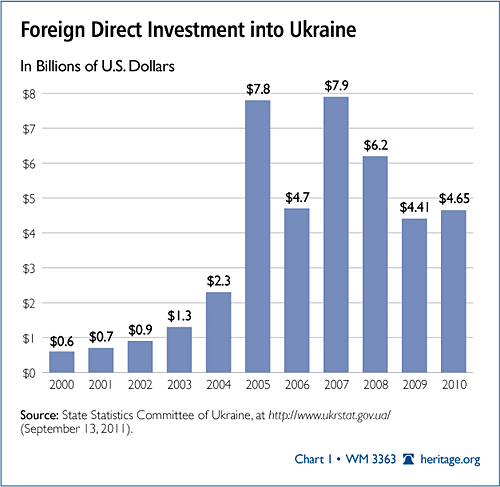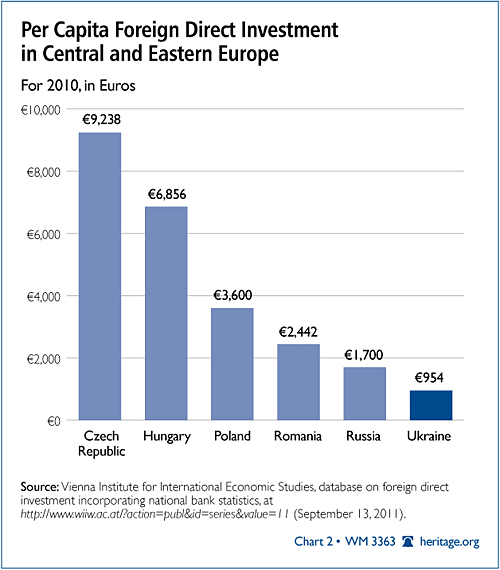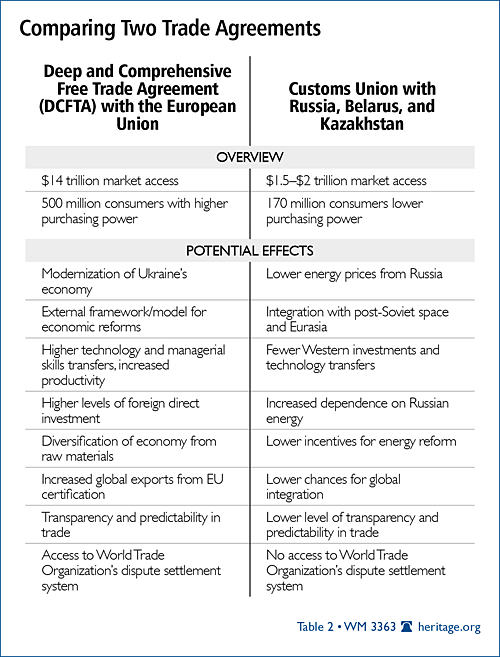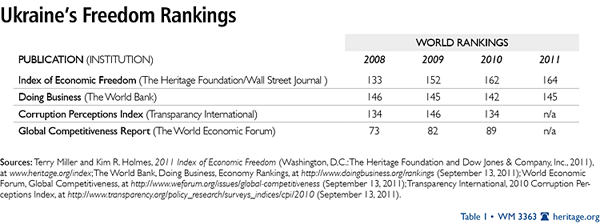Ukraine is at the crossroads of Eastern Europe and Eurasia. Its global economic integration among free, democratic, and prosperous nations should be an important American foreign policy priority. A rebirth of economic freedom in Ukraine could have a positive impact not only on Eastern Europe but also in Russia and other post-Soviet states.
Achieving this desirable outcome, however, will require the government of Ukrainian President Viktor Yanukovych to implement long-delayed structural reforms aimed at establishing a free-market democracy.
Opportunities and Obstacles
In the 20 years since independence in 1991, Ukrainians have dismantled the old Soviet political apparatus and centrally planned economy and, in so doing, transformed Ukraine’s economic, social, and political institutions. Between 1996 and 2005, Ukraine shot up by 15 points in the Index of Economic Freedom.[1] In that same period, the country’s GDP per capita increased by more than 30 percent.
More recently, however, serious obstacles to economic freedom in Ukraine have surfaced, as evidenced by the country’s low rankings on several international indices. (See table.) Politically connected groups have acquired controlling stakes in state-owned enterprises through non-transparent, insider privatization deals. Despite upbeat rhetoric promising free-market reforms, the country continues to suffer from rampant corruption, a large shadow economy (according to experts, at least 40 percent of GDP),[2] and an escalating demographic crisis caused by the country’s high mortality rate and the extensive out-migration of the workforce, including a “brain drain” of skilled labor.
As a result, Ukraine, like several other post-Soviet countries, is gradually regressing to an oligarchic, state capitalist system in which politics, business, and non-transparent economic activities intersect. The lack of political commitment to the free market and consistently poor economic decision making may derail Ukraine’s chances to integrate successfully into the European and global economies.
Why Does Ukraine’s Future Matter?
Ukraine’s territory is Europe’s largest (excluding Russia). Its 46 million consumers constitute the biggest market in Eastern Europe; it is an ideal platform for manufacturing and exporting to both Russia and the EU. Its extensive transportation infrastructure positions Ukraine as a major international trade hub.
In the energy sector, Ukraine could develop coal and natural gas fields as well as vast Black Sea offshore and shale gas reserves to counterbalance Russia’s aggressive strategy to dominate European energy markets. Of the 15 nuclear reactors currently operating in Ukraine, which generate about half of the country’s electricity, none are of the Chernobyl design.[3]
Ukraine is the most democratic in the Commonwealth of Independent States, with four free and fair national elections since 2004. The U.S. has been a major supporter of Ukraine’s quest for democratic and free-market transition as well as one of its largest foreign investors. The U.S. is also home to about 1 million Americans of Ukrainian origin. They care about its fate and constitute a reservoir of know-how for reviving their ancestral homeland.
Ukraine’s Post-Soviet Struggle
In recent years, Ukraine has been on an economic rollercoaster. Although economic growth between 2000 and 2007 averaged 7.5 percent, Ukraine had the severest decline of any European country in 2009, with GDP contracting more than 15 percent.[4] Lack of significant structural reform makes its economy especially vulnerable to external shocks.
Ukraine has fallen behind Central European neighbors like Poland, Hungary, the Czech Republic, Slovakia, and the Baltic countries (charts 1 and 2), which have managed to attract foreign direct investment (FDI) and transform their economies—now successfully integrated into the EU.


Ukrainian-Russian Economic Integration: Open and Equal Partnership?
Ukraine is probably the most important economy in Russia’s foreign policy strategy. Moscow views Ukraine as belonging to its sphere of privileged interests, and the Kremlin seeks to exert its power and influence there through energy dependence and hostile mergers and acquisitions.[5]
In exchange for cheap Russian gas, Ukraine signed the 2010 Kharkiv agreement extending the lease for Russia’s Black Sea Fleet in Sevastopol until 2042. Gazprom is trying to take over Ukraine’s gas pipeline infrastructure, which transports 80 percent of Russian gas to Europe, while simultaneously launching the Nord Stream gas pipeline to bypass Ukraine (and Belarus). Russian financial institutions have acquired controlling stakes in a number of Ukraine’s large banks as well as metallurgical and chemical companies.
DCFTA: The Crucial Choice Ahead for Kyiv
Political tensions between Ukraine and Russia are likely to intensify, as Kyiv is currently faced with a critical decision: It must choose between concluding negotiations on the Deep and Comprehensive Free Trade Agreement (DCFTA) with the EU by the end of 2011 or membership in the Moscow-led Customs Union (CU) with Belarus and Kazakhstan. Ukraine may choose only one; simultaneous membership is not possible.
It should be abundantly clear to the Yanukovych administration that the short-term gains of reversion to an inward-looking Eurasian economic sphere represented by the CU fall far short of the long-term benefits of looking Westwards—beginning with the DCFTA.

Evidence strongly suggests that Euro–Atlantic integration would increase Ukraine’s productivity, attract FDI in sectors other than raw material extraction, and, through technology and management skills transfers, make Ukraine more competitive and innovative.
Crucially, making Ukraine’s business regulatory environment consistent with European legal norms would have spillover effects in areas such as competition law, transparency in privatization procedures, public procurement, and more adequate anti-corruption mechanisms. Moreover, once certified by the EU, Ukraine’s exports to the rest of the world would also increase significantly.
In contrast, were Ukraine to join the CU, its trade policy, liberalized when it joined the World Trade Organization (WTO) in 2008, would be adversely affected. Import duties would increase to the level of the CU common tariff, hampering Ukraine’s global economic integration.
Also, below-market energy prices from Russia would delay long-overdue reform of the country’s inefficient and wasteful energy infrastructure. Finally, Ukraine would not be able to access the WTO’s dispute settlement system, since none of the CU members are in the WTO.
Recommendations
A Ukraine that gets back on the road to free-market democracy is in the best interests of Ukraine and the West. U.S., EU, and European policymakers should develop a cohesive long-term approach toward Ukraine that recognizes its strategic role between Western Europe and Eurasia.
A free and prosperous Ukraine would enjoy further reductions in poverty and more job creation through private-sector-led trade and investment. To realize these goals, the government of Ukraine should continue reforms; drastically curb corruption; promote a professional and independent judiciary system by prosecuting corrupt judges, prosecutors, and police officials; strengthen property rights; decentralize governing institutions; and make them more effective.
President Yanukovych should prioritize the attraction of FDI and incentivize free-market-led economic growth. Rules for an open, fair, and transparent privatization process are in place—they should be implemented. The government should ensure the sanctity of contracts and take all necessary measures to bring an end to hostile anti-market practices such as asset stripping and corporate raids.
An Important Crossroad
Ukraine’s 20th anniversary of independence is a good opportunity for the U.S. to re-focus on Ukraine as it seeks to revive its economy, raise the standard of living for its citizens, and integrate with the global economy. President Obama and Secretary of State Hillary Clinton, along with the leadership of Congress, should send strong signals of concern to Ukraine’s leadership.
James M. Roberts is Research Fellow for Economic Freedom and Growth in the Center for International Trade and Economics at The Heritage Foundation. Andriy Tsintsiruk is Assistant Director of Government Relations and Communications at the U.S.-Ukraine Business Council in Washington, D.C.



